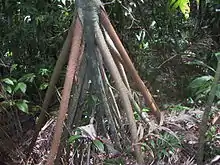| Socratea | |
|---|---|
 | |
| Socratea exorrhiza stilt roots | |
| Scientific classification | |
| Kingdom: | Plantae |
| Clade: | Tracheophytes |
| Clade: | Angiosperms |
| Clade: | Monocots |
| Clade: | Commelinids |
| Order: | Arecales |
| Family: | Arecaceae |
| Subfamily: | Arecoideae |
| Tribe: | Iriarteeae |
| Genus: | Socratea H.Karst. |
| Synonyms[1] | |
| |
Socratea is a genus of five species of palms found in tropical Central America and South America.[1][2][3]
It is commonly believed that Socratea can move away from where it germinated by growing roots on one side and abandoning them on the other. Attempts to detect this behavior have failed.[4] What is known for a fact is that these roots can, in the case of S. montana, grow to a length of 16.5 feet (five meters) and up to three inches (eight cm) in diameter.[5]
Species
- Socratea exorrhiza (Mart.) H.Wendl. - Costa Rica, Nicaragua, Panama, Colombia, Venezuela, the Guianas, Peru, Ecuador, Bolivia, northern and western Brazil (States of Amazonas, Amapá, Mato Grosso, Pará, Rondônia, Roraima)
- Socratea hecatonandra (Dugand) R.Bernal - Colombia, Ecuador
- Socratea montana R.Bernal & A.J.Hend. - Colombia, Ecuador
- Socratea rostrata Burret - Peru, Colombia, Ecuador
- Socratea salazarii H.E.Moore - Peru, Bolivia, western Brazil (State of Acre)
References
- 1 2 Kew World Checklist of Selected Plant Families
- ↑ Govaerts, R. & Dransfield, J. (2005). World Checklist of Palms: 1-223. The Board of Trustees of the Royal Botanic Gardens, Kew.
- ↑ Henderson, A. 1990. Arecaceae–Part I. Introduction and the Iriarteinae. Flora Neotropica, Monograph 53: 1–100
- ↑ Can 'Walking Palm Trees' Really Walk? At: Live Science
- ↑ Henderson, Andrew (May 2, 1990). "Arecaceae - Part 1". Flora Neotropica. 53: 84.
External links
This article is issued from Wikipedia. The text is licensed under Creative Commons - Attribution - Sharealike. Additional terms may apply for the media files.
